Fitting a boiler flue yourself isn't a simple task. It involves understanding various flue systems and complying with local regulations. You'll need technical expertise to guarantee safety and proper functioning. Missteps can lead to dangerous gas leaks or voided warranties. If you lack experience or knowledge, it's advisable to hire a professional. They guarantee compliance with safety standards and protect your investment. Discover more about the installation process and when it's crucial to call in the experts.
Key insights
- Fitting a boiler flue requires knowledge of local regulations and compliance to ensure safety and legality.
- Improper installation can void warranties and lead to costly repairs or safety hazards.
- If unsure about technical aspects or regulations, it's best to hire a qualified professional.
- Installation must follow manufacturer guidelines to prevent leaks and ensure proper function.
- Consulting a Gas Safe registered engineer guarantees compliance with safety standards and local codes.
Understanding Boiler Flue Systems
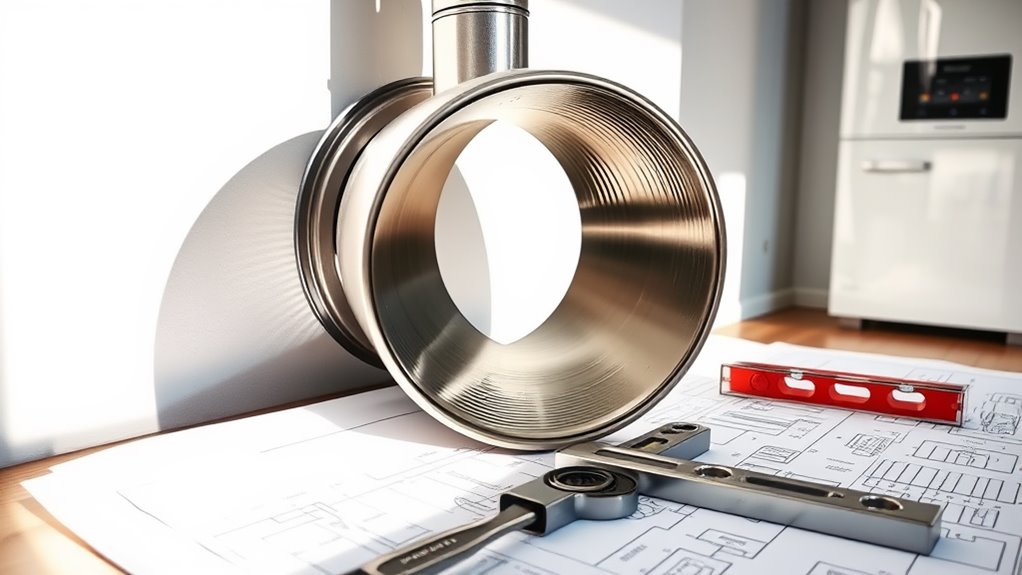
A boiler flue system is essential for safely venting combustion gases from your heating system to the outside environment. Understanding the various flue types, such as conventional, balanced, and condensing flues, is critical for effective installation. Each type has specific requirements based on your boiler's design and efficiency. When considering installation techniques, make sure you follow the manufacturer's guidelines closely. Proper sealing, alignment, and support are fundamental to prevent leaks and guarantee safety. Use appropriate materials that comply with the flue type, and consider factors like length and positioning to optimize performance. Thoroughly inspecting connections and joints will help maintain system integrity. By adhering to these principles, you can secure a reliable and efficient boiler flue system. Additionally, ensuring compliance with local building codes during installation can help mitigate any potential safety risks.
Local Regulations and Compliance
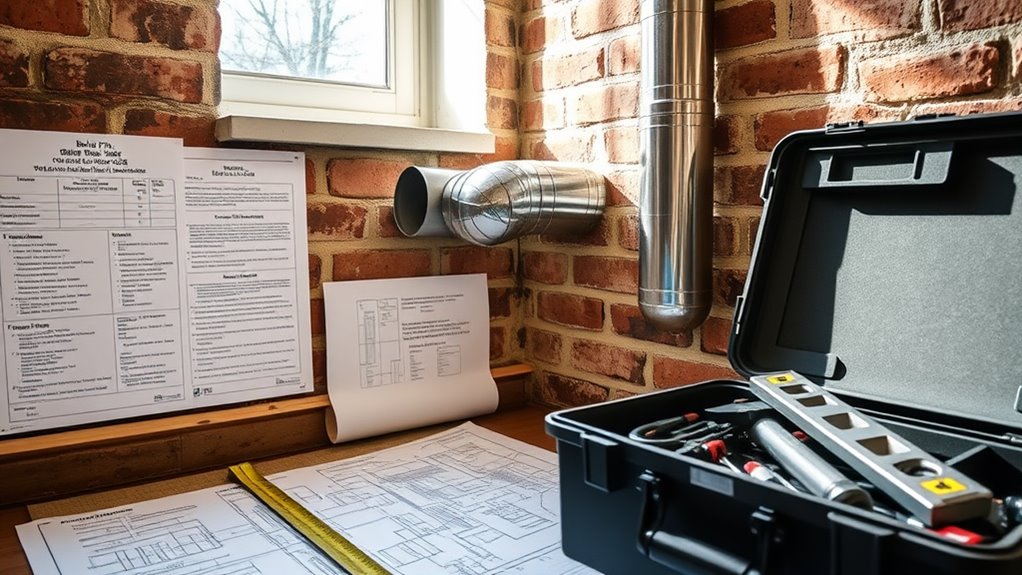
When fitting a boiler flue, you must consider local building codes and safety standards that govern installation. Compliance is essential not only for the safety of your home but also to avoid potential legal issues. Be sure to check the permitting requirements in your area before starting any installation work. Additionally, obtaining a Commercial Gas Safety Certificate is crucial to ensure that your installation meets safety regulations and standards.
Local Building Codes
How familiar are you with local building codes governing boiler flue installations? Understanding these codes is essential for guaranteeing local code compliance and maintaining building safety. Neglecting them can lead to serious consequences.
- You could face fines for non-compliance.
- Unsafe installations might put your home at risk.
- Future renovations could become complicated due to improper work.
Before you start your installation, check with your local building authority for specific regulations. Each area can have different requirements regarding flue materials, positioning, and venting. Ignoring these regulations not only jeopardizes safety but can also complicate future property transactions. Always prioritize understanding and adhering to local codes to guarantee that your boiler flue installation is safe and legal. Additionally, ensure that you are working with qualified engineers to perform any necessary checks to comply with safety regulations.
Safety Standards Compliance
Assuring your boiler flue installation complies with safety standards is essential for both functionality and legal adherence. You must familiarize yourself with local regulations that dictate how flues should be installed and maintained. These regulations often include specific requirements for safety inspections and compliance checks to assure the system operates safely and efficiently. Before starting your installation, check with your local authority to understand the necessary guidelines you must follow. Failing to comply can lead to serious safety hazards and legal repercussions. Additionally, consider hiring a qualified technician to perform the required inspections after installation. This step not only guarantees compliance but also provides peace of mind that your boiler flue is safe and functioning as it should. Regular maintenance of plant room systems is crucial to ensure long-term safety and efficiency.
Permitting Requirements Explained
Before you start your boiler flue installation, it's vital to understand the permitting requirements that vary by location. The permitting process can seem intimidating, but it's important for guaranteeing safety and compliance. Here's what you need to keep in mind:
- Local regulations can differ considerably, affecting your project timeline.
- Application requirements often include detailed plans and inspections, which may require professional assistance.
- Non-compliance can lead to fines, project delays, or even unsafe installations.
Be proactive about researching your local codes to avoid unnecessary headaches. Make sure to contact your local authorities for specific guidelines, as following these requirements not only keeps you within the law but also guarantees your installation is safe and effective. Additionally, working with Gas Safe registered engineers ensures that your installation meets current safety and environmental standards.
Safety Considerations
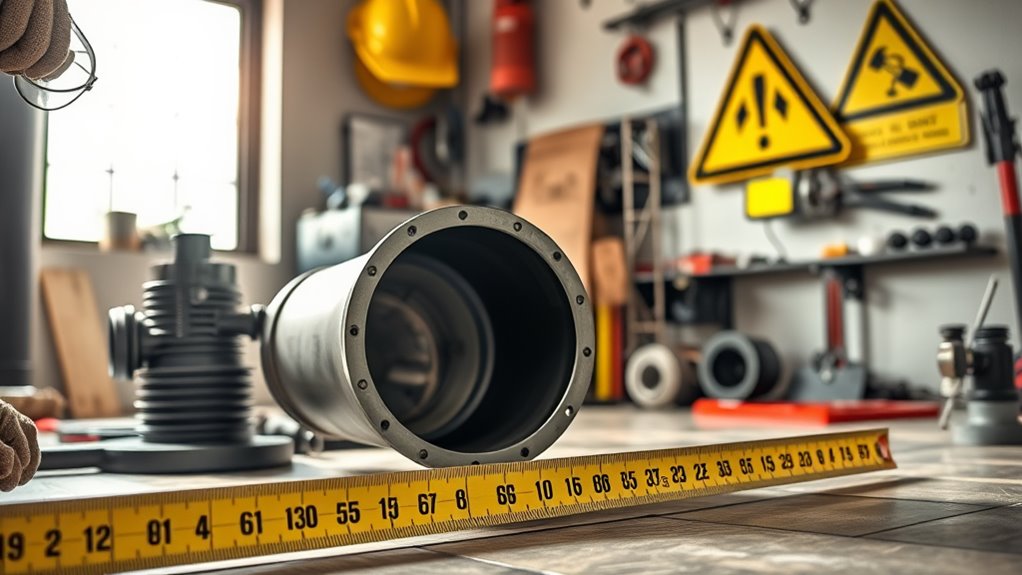
While fitting a boiler flue might seem straightforward, safety considerations are paramount to prevent hazardous situations. You must thoroughly understand ventilation requirements, as proper airflow is vital to prevent dangerous gas build-up. Confirm the installation area complies with local codes, and always consult the manufacturer's guidelines. Conduct risk assessments to identify potential hazards, such as carbon monoxide leaks or flue blockages. It's important to check that the flue route is clear and unobstructed, maintaining safe distances from combustible materials. If you're in doubt about any aspect of the installation, don't hesitate to seek professional assistance. Prioritizing safety not only protects you but also guarantees the efficient operation of your heating system. Additionally, regular maintenance can help prevent issues such as the Ea error code associated with ignition failures.
Tools and Materials Needed
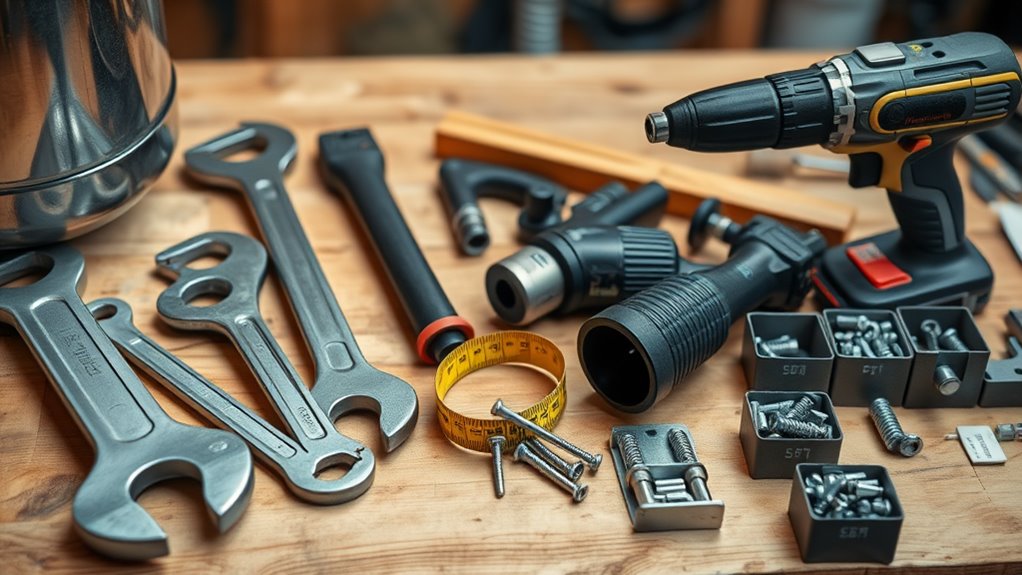
To successfully fit a boiler flue, you'll need a specific set of tools and materials to guarantee a proper installation. Having the right tools checklist and understanding the material requirements is vital for a safe and effective setup. Here's what you'll need:
- Drill and drill bits: Essential for making precise holes.
- Spirit level: Confirms your flue is perfectly aligned.
- Sealant: Prevents leaks and maintains efficiency.
Gathering these items beforehand will not only streamline your process but also give you peace of mind. Remember, taking the time to prepare adequately can make all the difference, transforming a challenging task into a manageable project. Your boiler's performance depends on a correctly fitted flue, so don't overlook these vital aspects! Additionally, ensure that you understand the error codes that may indicate issues arising from improper flue installation, as they can guide you in troubleshooting any resulting problems.
Step-by-Step Guide to Fitting a Boiler Flue
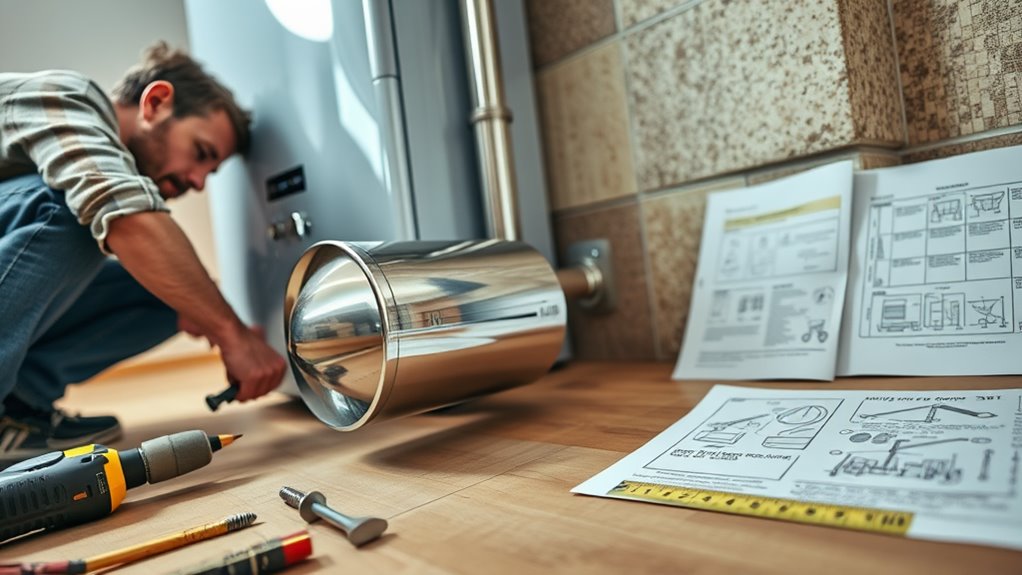
Once you've gathered all the necessary tools and materials, you can begin fitting the boiler flue. First, decide the ideal position for the flue, guaranteeing it meets local building regulations. Next, mark the wall where you'll cut the hole for the flue pipe. Use a drill and appropriate-sized hole saw to create the opening. After that, insert the flue through the wall, ensuring a proper angle for drainage. Secure it with brackets as specified in the manufacturer's instructions. Seal around the flue with weatherproof silicone to prevent leaks. Finally, connect the flue to the boiler, following all installation tips provided. It's crucial to check for visible leaks and guarantee proper ventilation before finishing the installation. Test for leaks and guarantee proper ventilation before finishing the installation.
When to Call a Professional
When fitting a boiler flue, it's vital to know when to call a professional. If you're unsure about safety regulations, lack the technical expertise, or want to maintain your warranty, seeking help is important. Professional installation guarantees compliance and protects both your system and your investment. Additionally, regular inspections can help identify potential issues before they escalate, ensuring the longevity and efficiency of your boiler system.
Safety Regulations Compliance
While you may feel confident in your DIY skills, it's crucial to understand that boiler flue installation is subject to strict safety regulations. Ignoring these can lead to serious consequences. Here are some key reasons to contemplate calling a professional:
- Safety Inspections: Professionals guarantee your installation meets industry standards, minimizing risks.
- Compliance Audits: They assure that your setup complies with local laws, avoiding potential fines.
- Peace of Mind: Knowing a qualified expert handled the installation allows you to rest easy. Additionally, understanding the importance of regular maintenance can help prevent future boiler issues.
Ultimately, adhering to safety regulations not only protects you but also guarantees proper functioning. When in doubt, don't hesitate to reach out for professional help to keep everything compliant and safe.
Technical Expertise Required
If you lack experience in plumbing or heating systems, attempting to install a boiler flue can lead to significant issues. Proper installation techniques are essential for guaranteeing the safety and efficiency of your heating system. Without the right knowledge, you might misalign the flue, compromise ventilation, or even cause dangerous gas leaks. Additionally, troubleshooting issues that arise from improper installation requires specialized expertise. If you encounter unexpected problems, like unusual noises or error codes, resolving them safely demands a professional's insight. In cases where you're unsure about any step in the installation process, it's wise to call a qualified technician. This guarantees compliance with regulations and assures that your boiler operates safely and effectively.
Warranty Considerations
Understanding warranty considerations is essential, especially since improper installation of a boiler flue can void your warranty. If you're unsure about your skills, it's wise to consult a professional.
Consider these warranty implications before proceeding:
- Voiding Coverage: Incorrect installation can lead to significant repair costs that your warranty won't cover.
- Repair Responsibilities: You may be held responsible for any damages caused by a faulty installation.
- Safety Risks: Improperly installed flues can lead to dangerous gas leaks and increased hazards.
To protect your investment and guarantee peace of mind, weigh the risks carefully. If there's any doubt, calling a qualified technician can save you from potential headaches down the line.
Frequently Asked Questions
What Types of Boiler Flues Are Available on the Market?
When looking at flue types, you'll find several options, including vertical, horizontal, and concentric flues. Each has its specific installation methods that cater to different boiler setups and building designs. Vertical flues exhaust through the roof, while horizontal flues exit through walls. Concentric flues combine intake and exhaust in one unit, offering space efficiency. Understanding these options helps you choose the right flue for ideal performance and safety in your heating system.
Can I Extend an Existing Boiler Flue?
You can extend an existing boiler flue, but you must follow specific flue extension guidelines to guarantee safety and efficiency. It's essential to check the manufacturer's specifications and local regulations before proceeding. DIY flue safety is paramount; improper installations can lead to dangerous exhaust leaks or reduced performance. If you're unsure about the process, consulting a qualified professional is always the best option to secure compliance and safety in your home.
How Can I Tell if My Flue Is Blocked?
To determine if your flue is blocked, use flue inspection methods like visual checks and smoke tests. Look for flue blockage signs, such as unusual odors, poor appliance performance, or excessive condensation. You might also notice strange noises or a yellow flame instead of a blue one. If you suspect a blockage, it's vital to address it immediately to guarantee safety and efficiency. Regular inspections can help prevent future issues.
What Is the Lifespan of a Boiler Flue?
The boiler flue lifespan typically ranges from 10 to 15 years, depending on factors like material and maintenance. To guarantee your flue lasts, follow these flue maintenance tips: regularly inspect for blockages, check for corrosion, and verify proper installation. Keeping the flue clean and addressing any issues promptly can greatly extend its lifespan. Always consult a professional if you notice any signs of wear or damage, ensuring your system operates safely and efficiently.
Are There Any Environmental Considerations for Flue Installation?
When considering flue installation, you must account for environmental regulations and compliance with emission standards. It's essential to follow installation guidelines provided by local authorities to guarantee that your setup minimizes harmful emissions. Improper installation can lead to increased pollutants entering the atmosphere, which not only affects air quality but may also result in legal penalties. Always prioritize eco-friendly practices and consult a professional if you're unsure about the requirements.
Summary
Fitting a boiler flue yourself can be feasible if you understand the system and comply with local regulations. However, always prioritize safety and guarantee you have the right tools and materials. If you're uncertain about any steps or local codes, it's best to consult a professional. Proper installation is essential not only for efficiency but also for your safety and the longevity of the system. Don't hesitate to seek expert help when needed.

